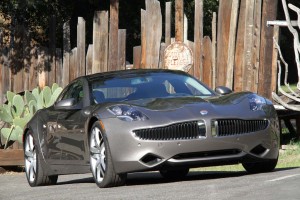Desperate for cash and struggling to restart its production lines after discovering a costly manufacturing defect, battery maker A123 has inked a tentative deal with a Chinese auto parts firm that could generate $450 million in much-needed cash.
But, in the end, the Wanxiang Group could end up with as much as 80% of Massachusetts-based A123, which currently provides batteries for the Fisker Karma and counts General Motors among the other automakers it has signed contracts with.
The deal “will be beneficial” in a number of ways, said A123 CEO David Vieau, during a conference call to discuss the high-tech firm’s quarterly earnings and the Wanxiang deal. Most immediately, it will provide cash the American company desperately needs after some unexpectedly severe financial setbacks. It will also help open up more markets for A123’s batteries, especially in China, and could improve economies of scale – translating into lower production costs, Vieau suggested.
“Today’s announcement is the first step toward solidifying a strategic agreement that we believe would remove the uncertainty regarding A123’s financial situation,” he said.
The non-binding agreement would provide $75 million in initial bridge financing, with Wanxiang then buying $200 million in senior notes. It would have the opportunity to follow with another $175 million investment in A123 which maintains a major manufacturing facility in the Detroit suburbs.
That factory is at the heart of A123’s current problems. Earlier this year the maker discovered a defect in its lithium-ion battery packs – including those used in the Fisker Karma – that could cause a complete loss of power. It has not only had to absorb the cost of an extensive battery recall but make complex fixes to its production lines.
While the company is again producing batteries, the ramp-up has been slower than expected and will only reach 75% of capacity by October, Vieau revealed. The good news/bad news scenario is that demand has been growing and “We need more cells than we’re currently making to satisfy our customer demand.”
During the conference call, the company suggested it had 37 development and production programs underway, suggesting that if it can make it through its current financial crisis it has a “profitable” future, according to the CEO. If anything, it hopes the news of a new source of capital will encourage even more potential customers to sign on, overcoming concerns about whether A123 would be around to deliver the goods when needed.
In the near-term, the company has a lot of work to do, however, and it revealed that its net loss widened to $82.9 million during the second quarter compared to $55.4 million a year ago. The company took a $3.3 million write-down on the closing of its Korean battery plant. Revenue, meanwhile, slipped 53%, to $17 million, as A123 focused on repairing its manufacturing defects.
Along with the Fisker Karma and planned Fisker Atlantic plug-in hybrids, A123 has confirmed it will be the battery supplier for General Motors’ planned Chevrolet Spark battery-electric vehicle.
The company is also aiming to expand demand on the global power grid. Some utilities are turning to battery backup systems to help level out supply and demand, especially for renewable sources, such as wind and solar, which do not necessarily provide steady current loads.

